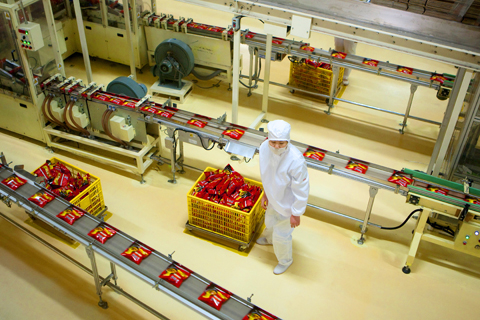Taiwan-listed shares of Tingyi (Cayman Islands) Holding Corp (康師傅控股), China’s biggest maker of instant noodles and ready-to-drink tea, were limit-up on their first trading day on the back of a strong China’s economic growth.
Tingyi’s Taiwan depositary receipts (TDRs) climbed 7 percent to NT$48.15 (US$1.5), beating the main index’s 1.63 percent increase.
In Hong Kong, Tingyi slipped 5.16 percent, steeper than the Hang Seng Index’s 0.93 percent drop.

PHOTO: BLOOMBERG
The company priced its 380 million TDRs at NT$45 each, expecting to raise NT$17.1 billion in capital from the issuance. It is the biggest such offering by a Taiwan-owned, China-focused company since the government eased restrictions in hopes of stimulating local capital markets by encouraging firms to list on the domestic bourse.
Tingyi chairman and CEO Wei Ing-chou (魏應州) told investors on Tuesday that the company aimed to allocate nearly 90 percent more in capital spending next year, or up to US$500 million.
Of that, 80 percent would go to expanding production of beverages, a fast growing segment in which it aims to grow at four times the pace of GDP growth in China next year, he said.
The company will also spend around US$100 million next year to expand its noodle business in China, where it expects 10 percent to 12 percent growth in noodle sales.
Within five years, it aims to raise the annual revenue from at least five products to US$10 billion each, a figure equivalent to its total sales this year, Wei said.
Separately, Neo-Neon Holdings Ltd (真明麗控股), the world’s biggest maker of decorative lights, which is listed on the Hong Kong stock market, is oversubscribed by 16 times for its secondary offer of NT$12.9 TDRs, underwriter Fubon Securities Co (富邦證券) said yesterday.
The company’s diversification into the fast-growing LED lighting sector, especially in China, made Neo-Neon appealing to investors, Fubon Securities said.
Neo-Neon, founded by Taiwanese Ben Fan (樊邦弘), landed an additional order of 10,000 LED street lamps this month from the Jiangsu Province local government in China, bringing total orders from China to 100,000, Stephen Chan (陳恩光), a Fubon Securities senior vice president, said in a press release.
The progress gave Neo-Neon the upper hand in winning more orders from Chinese local governments. LED street lamp installations in China should increase to 2.5 million units over the next three years as requested by the central government, Chen said.
Neo-Neon planned to ship the LED lamps in the first quarter of next year, Chen said.
The lamp maker is set to sell 140,000 TDRs next Tuesday, which will help it raise NT$1.8 billion in funds to expand capacity.
Each TDR represents 0.5 common shares of Neo-Neon.
The company planned to buy 30 units of metalorganic chemical vapor deposition for its LED plant in Yangzhou.
In August, the China Environment Fund bought an 11 percent stake in Neo-Neon for US$30 million and became its biggest institutional investor, indicating that Neo-Neon has good chances on China’s LED market.

Quanta Computer Inc (廣達) chairman Barry Lam (林百里) is expected to share his views about the artificial intelligence (AI) industry’s prospects during his speech at the company’s 37th anniversary ceremony, as AI servers have become a new growth engine for the equipment manufacturing service provider. Lam’s speech is much anticipated, as Quanta has risen as one of the world’s major AI server suppliers. The company reported a 30 percent year-on-year growth in consolidated revenue to NT$1.41 trillion (US$43.35 billion) last year, thanks to fast-growing demand for servers, especially those with AI capabilities. The company told investors in November last year that

Intel Corp has named Tasha Chuang (莊蓓瑜) to lead Intel Taiwan in a bid to reinforce relations between the company and its Taiwanese partners. The appointment of Chuang as general manager for Intel Taiwan takes effect on Thursday, the firm said in a statement yesterday. Chuang is to lead her team in Taiwan to pursue product development and sales growth in an effort to reinforce the company’s ties with its partners and clients, Intel said. Chuang was previously in charge of managing Intel’s ties with leading Taiwanese PC brand Asustek Computer Inc (華碩), which included helping Asustek strengthen its global businesses, the company

Taiwanese suppliers to Taiwan Semiconductor Manufacturing Co. (TSMC, 台積電) are expected to follow the contract chipmaker’s step to invest in the US, but their relocation may be seven to eight years away, Minister of Economic Affairs J.W. Kuo (郭智輝) said yesterday. When asked by opposition Chinese Nationalist Party (KMT) Legislator Niu Hsu-ting (牛煦庭) in the legislature about growing concerns that TSMC’s huge investments in the US will prompt its suppliers to follow suit, Kuo said based on the chipmaker’s current limited production volume, it is unlikely to lead its supply chain to go there for now. “Unless TSMC completes its planned six

TikTok abounds with viral videos accusing prestigious brands of secretly manufacturing luxury goods in China so they can be sold at cut prices. However, while these “revelations” are spurious, behind them lurks a well-oiled machine for selling counterfeit goods that is making the most of the confusion surrounding trade tariffs. Chinese content creators who portray themselves as workers or subcontractors in the luxury goods business claim that Beijing has lifted confidentiality clauses on local subcontractors as a way to respond to the huge hike in customs duties imposed on China by US President Donald Trump. They say this Chinese decision, of which Agence